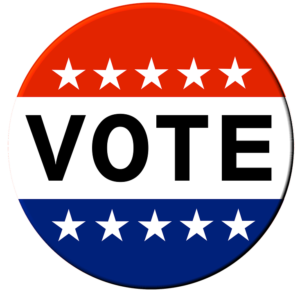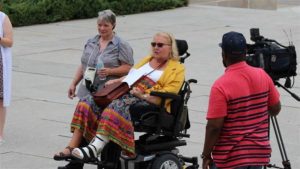Although one in six voters has a disability, the disability community is often not recognized as an engaged voting constituency. Citizens with disabilities want to be engaged in the voting process; they want to learn about candidates, show up at the polls, and engage in campaigns. Unfortunately, there are many barriers to civic engagement for people with disabilities. Some of these barriers, such as impediments to voting accessibility, are issues that disability advocacy organizations and the government study and work to improve continuously. However, there’s very little information and few resources available to campaigns related to accessibility and voters with disabilities.
 Campaigns are essential components of civic engagement. They are where prospective voters can meet candidates, learn about what problems and solutions are being discussed in their communities, and form opinions that will influence their vote. Campaigns must connect with their communities and learn about their interests so that they can understand their voters’ needs. If a campaign isn’t accessible, they aren’t able to connect with their community fully, and many prospective voters with disabilities can experience barriers to learning about or participating in a campaign. Furthermore, campaigns are often powered by volunteers, and if they aren’t accessible, they’re both cutting off essential help and creating barriers to civic participation for people with disabilities who wish to be involved in the political process. It is up to campaigns to make sure that their information and events are accessible to voters with disabilities, and that they are reaching out to the disability community to actively include them.
Campaigns are essential components of civic engagement. They are where prospective voters can meet candidates, learn about what problems and solutions are being discussed in their communities, and form opinions that will influence their vote. Campaigns must connect with their communities and learn about their interests so that they can understand their voters’ needs. If a campaign isn’t accessible, they aren’t able to connect with their community fully, and many prospective voters with disabilities can experience barriers to learning about or participating in a campaign. Furthermore, campaigns are often powered by volunteers, and if they aren’t accessible, they’re both cutting off essential help and creating barriers to civic participation for people with disabilities who wish to be involved in the political process. It is up to campaigns to make sure that their information and events are accessible to voters with disabilities, and that they are reaching out to the disability community to actively include them.
To assist political campaigns with understanding the access needs, potential barriers, and interests of the disability community, the National Council on Independent Living has created “Including People with Disabilities in Your Political Campaign: A Guide for Campaign Staff.” This guide is a basic resource that campaigns at the local, state, and national levels can use to learn how they can become accessible not only to voters with disabilities, but also to people who want to volunteer with the campaign. It addresses the basics of understanding people with disabilities as a voting bloc; different types of potential accommodations for people with different disabilities; making your campaign website, materials, and events accessible; integrating disability into your policy platform; and including volunteers with disabilities in your campaign.
Including People with Disabilities in Your Political Campaign: A Guide for Campaign Staff:
This guide is a first step to making your campaign accessible, and although we strive to make it as inclusive and thorough as possible, it is not intended to be the one and only way to make your campaign accessible. Also note that accessibility is not a one-time fix, but something that must be continuously considered and integrated to be successful. It is essential for campaigns to reach out to people with disabilities in their community and learn about their interests and needs as voters and volunteers. If you have any questions about this guide, please contact Sarah Blahovec, Disability Vote Organizer, at [email protected].

 In a February article entitled “
In a February article entitled “
